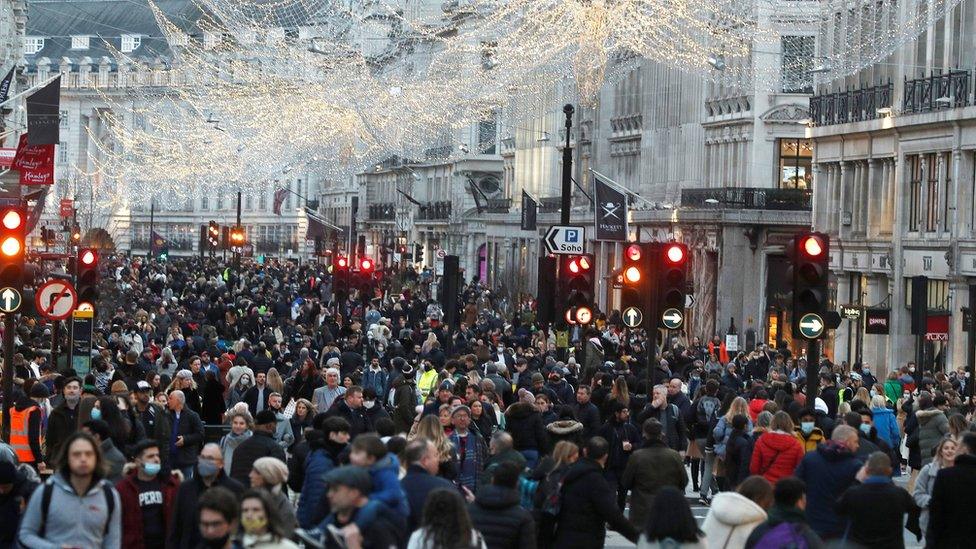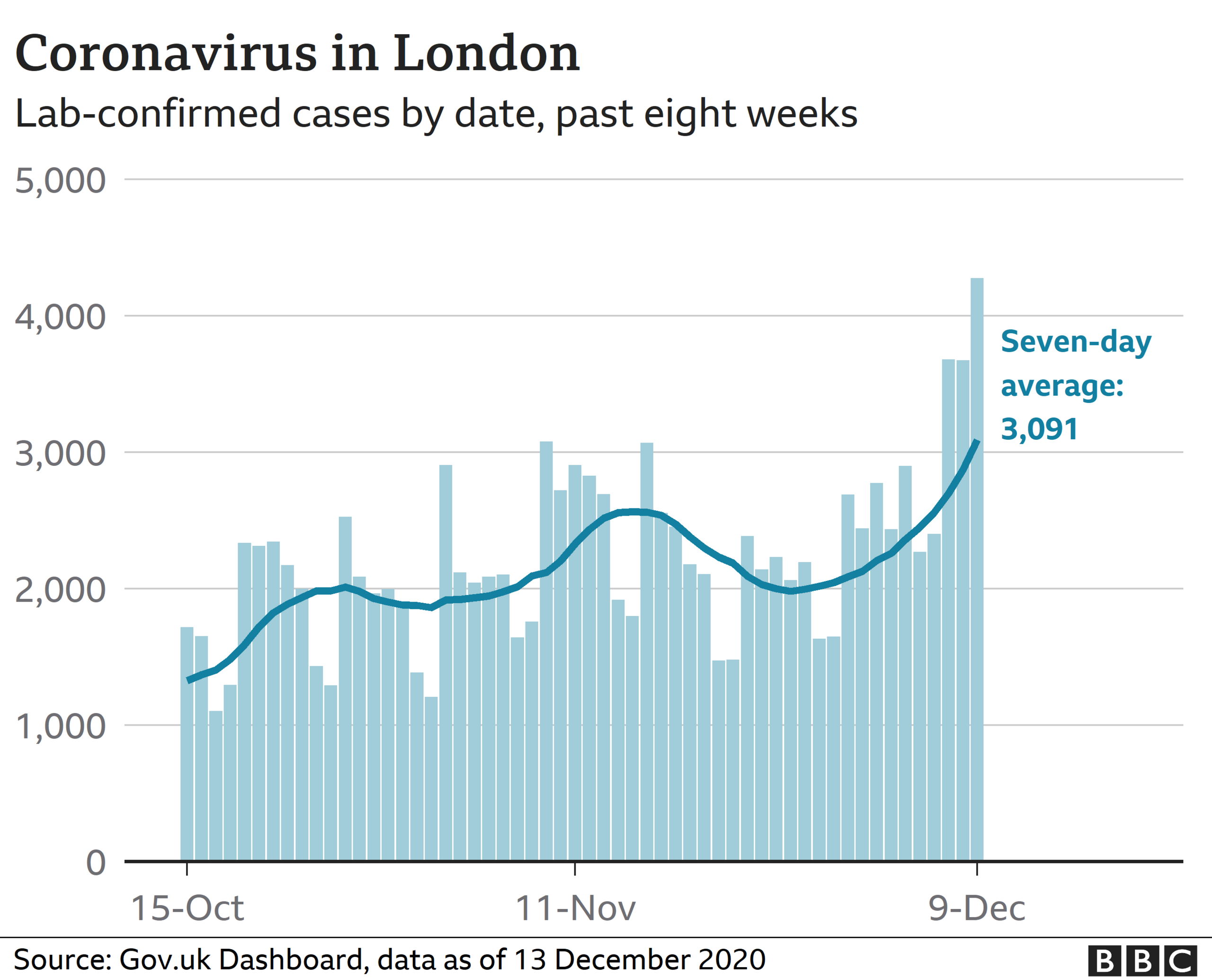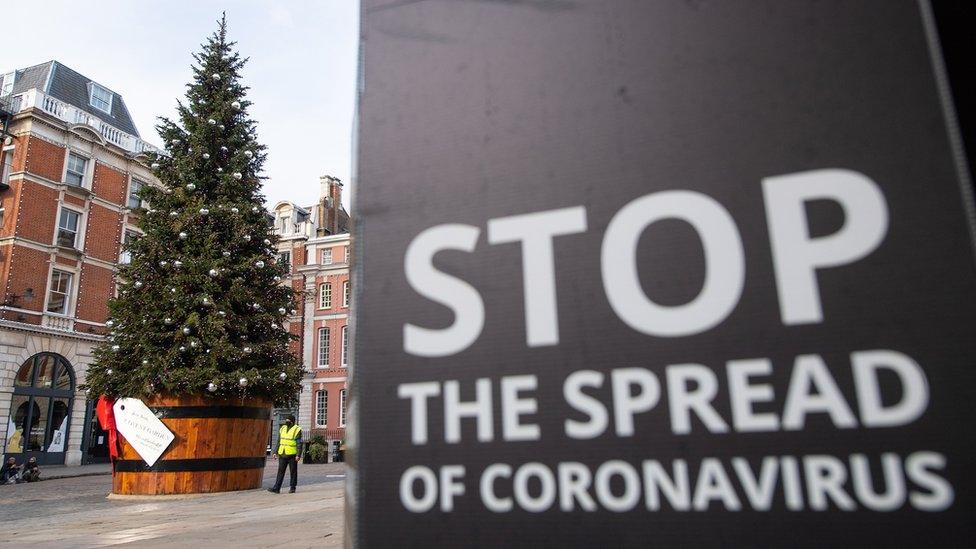Covid: London likely to move to tier 3 amid rising rates
- Published

The weekend saw crowded shopping streets in London, which is currently under tier two restrictions
London faces a move to tier three - England's highest level of coronavirus restrictions - in the coming days, the BBC has been told.
Ministers and officials are said to be "deeply concerned" about a sharp rise in Covid-19 cases across the capital.
BBC health editor Hugh Pym reports London MPs have been briefed on the data, but no decision has been taken.
London Mayor Sadiq Khan urged ministers to act "with open eyes" and avoid damaging the capital's economy.
He said tier three could have a "catastrophic consequence" for hospitality, culture and some retail, as pubs and restaurants would be limited to takeaways or deliveries.
Council leaders in London are understood to be alarmed at the projected rise in cases and some are pushing for a "tier three plus" regime with tougher restrictions than tier three on its own.
Essex may also be moved from tier two to tier three, which would see hotels largely closed, sports fans excluded from events, and residents advised against travelling to other areas.
With Kent, Medway and Slough already under tier three rules, large parts of south-east England could soon join much of the Midlands, North West and North East under the strictest curbs on social contacts.
Health Secretary Matt Hancock is expected to make a statement in the House of Commons at 15:30 GMT and later lead a Downing Street news conference.
He is also due to speak to London MPs shortly before he appears in the Commons, Rupa Huq, Labour MP for Ealing Central and Acton, said.

What are tier three (very high) rules?
You cannot mix indoors, in private gardens or in most outdoor venues, except with your household or bubble
You can meet in a group of up to six in other outdoor spaces, such as parks, beaches or countryside
Shops, gyms and personal care services (such as hairdressing) can stay open
Bars, pubs, cafes and restaurants must stay closed, except for delivery and takeaway
Sports fans cannot attend events in stadiums
Indoor entertainment venues - such as bowling alleys and cinemas - must stay closed
People are advised not to travel to and from tier three areas

Some areas in and around London have recorded large increases in confirmed coronavirus cases over the past week.
In the week to 12 November, Havering was the only area of London in the top 100 places in England with the highest infection rates, at 85th.
It now has the fifth highest rate, at 506 cases per 100,000, BBC England data unit's Rob England said.

Back in November, London had the third lowest regional rate of about 187 cases per 100,000, while Yorkshire and the Humber recorded the highest at 443 per 100,000.
Now the two regions seem to have swapped places, with Yorkshire enjoying the third lowest rate of about 170 per 100,000.
Hugh Pym described the situation as "fast-moving" and that he understood health officials presented data showing a sharp rise in virus cases - risking further rapid increases in the coming days.


The east of London and the bits of Essex and Kent that border it have now become the hotspots for Covid.
Cases are rising and there are several east London boroughs that have seen more than 350 cases per 100,000 people in the past seven days.
To put that in perspective, Manchester which is in tier three, has seen 176 cases per 100,000 in the past seven days.
What has provided some protection for London is the fact hospitals have not been at immediate risk of being overwhelmed.
Latest data from London from a week ago showed one in nine beds were available.
But admissions have continued to go up since - causing real concern behind the scenes.
Other parts of the capital have lower rates, but there are signs they are rising too.
That's why the government feels it has little option but to act.

Experts warned last week that London should be placed in tier three immediately to avoid an increase in coronavirus deaths.
But at the time the Department of Health said a review of tiers would happen every 14 days, with the next due on 16 December.
Meanwhile, London's mayor has urged the government to ask all secondary schools and colleges in the capital to close early ahead of Christmas.
Sadiq Khan said he also wanted an extended break for schools as there are "significant" Covid outbreaks among 10 to 19-year-olds.
Islington Council has followed Greenwich in advising schools to switch to remote learning from Tuesday.
Downing Street said it expects all schools and colleges in England to remain open until the end of term on Thursday.

SUPPORT BUBBLES: What are they and who can be in yours?
FACE MASKS: When do I need to wear one?
TESTING: How do I get a virus test?

Despite coronavirus cases continuing to rise, No 10 said the government "has no plans to review the Christmas guidelines" which effectively suspend the tier system of restrictions and allow more households to mix.
It came as people in Scotland were told to "cut down" the number of contacts in the week before Christmas if they plan to meet up with relatives.
In Wales, a second health board has suspended non-urgent care amid a continued rise in cases. And a leading doctor in Northern Ireland said its health service is facing a "nightmare" scenario in January.
Elsewhere, Covid vaccinations have started being given to patients at GP surgeries in England as part of the next stage of the rollout of the vaccine programme.
Overall on Sunday, confirmed cases rose by 19% across the UK compared with the previous seven days, with 18,447 reported. A further 144 deaths were also recorded.
Laura Foster explains the three tier system for England

GREG JAMES' CHRISTMAS TAKEOVER: 60 minutes of festive bangers chosen by you
NEW PODCAST "I'M NOT A MONSTER": How did an American family end up in the heart of the ISIS caliphate?


How will you be affected by this? Share your experiences by emailing haveyoursay@bbc.co.uk, external.
Please include a contact number if you are willing to speak to a BBC journalist. You can also get in touch in the following ways:
WhatsApp: +44 7756 165803
Tweet: @BBC_HaveYourSay, external
Please read our terms & conditions and privacy policy
If you are reading this page and can't see the form you will need to visit the mobile version of the BBC website to submit your question or comment or you can email us at HaveYourSay@bbc.co.uk, external. Please include your name, age and location with any submission.
Related topics
- Published9 December 2020

- Published1 July 2022
